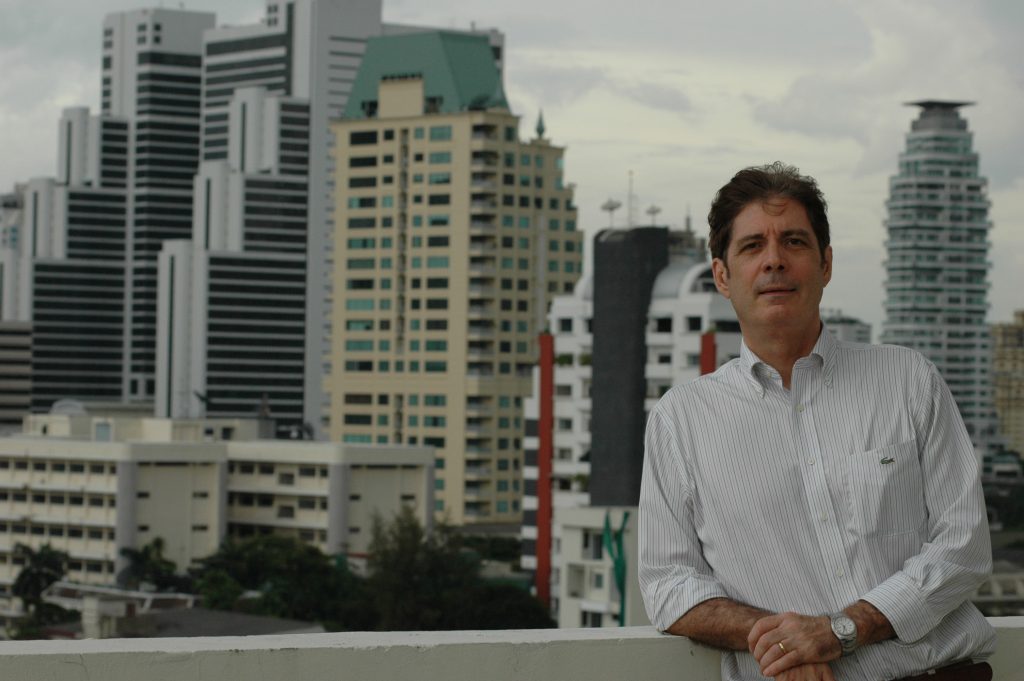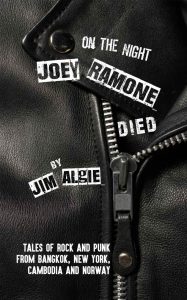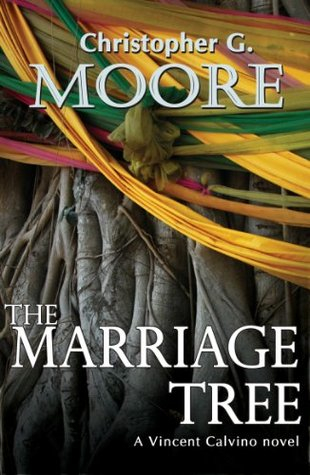Christopher G. Moore’s Vincent Calvino series is not only a fine collection of finely calibrated mysteries; it’s also a chronicle of many major upheavals – political, criminal, pathological and even psychosexual – which have upset Southeast Asia over the last two decades, and in this book he addresses the plight of the Rohingya refugees, one of the world’s most persecuted minorities.
Zero Hour in Phnom Penh, which won the German Critics Award for Crime Fiction, details the traumatic, UN-backed elections in Cambodia in 1993. Comfort Zone, set in Vietnam, plays out against the backdrop of the United States lifting the economic embargo against Vietnam in 1994. Two years later, The Big Weird, set in Bangkok, forecasted the rise of cyber-sex and online porn long before they became mainstream.
More recently, Pattaya 24/7 had Calvino and his partner – the sax-playing, Shakespeare-quoting Police Colonel Pratt – investigating a Muslim terrorist threat during the SARS epidemic, while Missing in Rangoon delved into a disappearance in the Burmese capital during the country’s recent convulsions as it opens to the world, and a deadly car bombing in Bangkok.
The Marriage Tree, number 14 in the series, continues on from those cataclysmic events with Calvino suffering the side effects of Post Traumatic Stress Disorder as he starts to see the specters of the slain. Though I’m not an authority on the mystery genre, this is the first time I’ve ever seen a detective in psychotherapy before. Calvino’s first-person journal entries, written for his psychiatrist, a Thai woman named Dr. Apinya, make this the most personal book in the series.
The opening is riveting as ironies abound. The French took to American noir because they enjoyed the existential ennui of the genre. But here we have a reversal as Vinnie discusses the Greek myth of Sisyphus, condemned to roll a boulder up a hill that rolls back down again, which was modernized by the French author Albert Camus as a reflection on the futility of work – indeed, all human endeavours.
True to the series, Moore weaves a topical thread into the plotline. The plight of the Rohingya refugees has been documented many times, but it has not been dramatized like this. Explaining too much would be tantamount to spoiling some of the devious plotting. Let’s just say that when a novelist brings his powers of description and sense of empathy to bear on a subject such as this, the wholehearted tragedy of these crimes against humanity hits home in a powerful way.

Author Christopher G. Moore has added a timely element about the Rohingya refugee crisis to this crime novel.
REALITY BYTES
The writer’s penchant for depicting real places and real people, like a murder suspect who is an Indian peanut vendor that works on Soi Cowboy, erases the borderline between crime reporting and crime fiction.
Sometimes his readers cannot tell the difference either. At a talk he gave at the Bangkok Literary Festival in 2012, the former law professor mentioned how a Thai fan kept questioning him about how he had solved the Saudi jewel heist back in Zero Hour in Phnom Penh? In fact, outside of that novel, the real mystery has yet to be resolved.
The Canadian author has never shied away from depicting the harsher truths of life in Thailand, like the rampant xenophobia, or the persecuted Rohingya refugees. When Calvino’s secretary, Ratana, first hears about the Indian suspect she is certain that he’s the killer and that he should be executed.
Moore does not shy away from portraying the brutality of the Thai police either; they give Vinnie a good working over with telephone books because he’s the first one to spot the dead beauty lying beside the jogging track of the Thailand Tobacco Monopoly.
A deficiency in this book, and the series in general, are the flights of metaphorical fancy that have little to do with the plot or characters. Early in the book, Goya’s giants and The Matrix are invoked in the same paragraph. Later it’s Darwinism and the Galapagos Islands, astronauts and elementary particles. Other strange similes like, “He held out a half dozen shopping bags like a man with a divining rod searching for water” and crows that caw like “wounded sentinels on a battlefield” also distract from the storyline.
Moore’s writing is at its best when he sticks to the nitty gritty details and the sort of punchy prose that Dashiel Hammett pioneered and Elmore Leonard perfected. “Seated across him was Akash, skinny, dark, with sharp features, his moustache glistening with a thin sheen of sweat. His eyes burned a fiery brown adrift in a red sea. The previous day Akash had heard the news of the death sentence handed down to four Indians convicted of raping and murdering a woman.”
Now there’s another true crime story that will resonate with newspaper readers and CNN watchers.
If the prose can be a little flabby in places, the plotting is taut and the sense of pacing sharp. To have a murder suspect killed just before the police or the detectives arrive is not the most original move in the thriller playbook – and it happens a few times in The Marriage Tree – but it’s done with a certain aplomb and an articulation of details that is fascinating – like the woman whose breast implant leaks after she’s been shot to death.
That Thai female obsession with cosmetic surgery and labiaplasty is another topic of today that adds a few nips and tucks to the murder investigation.
EXPAT CHRONICLE
One of the series’ strong suits is that it also functions as a chronicle of expat life in Thailand. In the early books like Spirit House, which looks likely to become a major Hollywood film in the next year or two – I would cast Robert Downey as Calvino, but it may be another A-lister – is that you would not see a character like the American lawyer and financial consultant who has cufflinks sporting his initials.
The descriptions of his lavish office in a high-rise office off Silom Road are equally lavish. Calvino’s terse judgment is revealing – not only of him but a new breed of expat that now migrates to Bangkok in droves. “He might not understand a lot about Thai culture, but he got one thing right – in Thailand appearance is substance. What you see is all there is. Nothing behind the mask but another mask, so what would be the point of ripping off the mask?”
When the series began in the early 90s, no expat moved to Thailand because it was a shrewd career move – quite the opposite. For any prospective employers in the West, to put that you’d worked in Bangkok on your CV would be like saying you’d just served a jail term for being a sex offender.
HIGH-TECH HUMANISM
The Calvino books also provide ample evidence of the evolution of CSI technology. It’s gotten very high-tech. Some of the gadgets the detective deploys, from pinhole cameras hooked up to an iPad to GPS trackers and directional mics, are ingenious. And I’m probably not the only one who has never heard of “cleaners” before – professional crime-scene cleaners that is.
Compelling as they are, all those CSI details take second place to the all-too-human intricacies of the Rohingya refugee crisis and the private eye’s breakdown. In trying to heal himself, with the help of the psychiatrist, Calvino finds himself returning to an old role – hunting down the overlords of the underdogs.
Fourteen books into this marathon mystery series and you would think that Christopher G. Moore and Vincent Calvino might be flagging, when it looks like they’re just hitting their stride.
2017 update: In the biggest human trafficking case in Thai history, several kingpins responsible for trafficking Rohingya into Thailand were sentenced to lengthy jail terms.
Jim Algie’s latest book, On the Night Joey Ramone Died: Tales of rock and punk from Bangkok, New York, Cambodia and Norway, details the life of a falling rock star trying to make a comeback in middle age. It’s available on Amazon.



Recent Comments